It seems like every week gas prices are climbing to record highs. And as such, many people are looking towards electric cars as a way to eliminate frequent, wallet-draining trips to the gas station.
It’s a big change going from a gas car to one that runs on electricity. Between shorter ranges, charging times, and the extra costs, it can be a big step to make the change.
Not to mention at this time, you could be waiting a while for one when you go to order one.
I recently bought an electric car, and it’s the best car I ever bought. And it goes well beyond laughing at the high price of gas whenever I see it.
Here’s my experience to date with an electric car, so you can see for yourself if it’s worth it.
Never miss an amazing deal again + get our bonus 250+ page eBook for FREE. Join 50,000 other Canadians who receive our weekly newsletter – learn more.
Why we decided to buy an electric car
There’s a big downside to buying an electric car – the initial cost. There’s no denying that electric cars cost more than buying a gas or even a hybrid.
When we decided we were buying a new car, we only wanted an electric car but also considered a plug-in hybrid. We didn’t really need a new car at the time as our previous gas vehicle was running just fine. With shortages of new cars at dealers, we could afford to wait for a new vehicle to arrive.
My partner drives around 100 km per day for work. Seeing as though most plug-in hybrids don’t have an electric range greater than 50 km, we decided we were going all electric for our new car.
We still needed to make sure it made financial sense. With all the driving being done on the car, which is around 3,000 km per month, I put some numbers together to get an idea of what we would save on gas/energy costs per month.
I came up with a number of $250 per month, which was based on the efficiency of the car it was replacing (a 2014 Subaru Outback), gas at $1.35 per litre (what a time that was), and the estimated electricity the new car would use.
That was more than enough to convince us to go electric. And that didn’t factor in these other benefits:
- much lower maintenance costs over a gas engine (something plug-in hybrids won’t save), and
- our province doesn’t charge vehicle registration fees for EV’s.
And we haven’t discussed the rebates. We live in Prince Edward Island, and we could save another $10,000 on the total cost when combined with the federal rebate (and the province also gives away a free level 2 charger).
One fear people have with EVs are range, with going on a road trip being the primary concern in this regard.
We don’t go on long road trips often, but we also have a regular gas car to fall back on for them should we decide our EV won’t be able to make it.
Deciding on the best electric cars for us
Now that we had made our decision on going electric, what cars did we shortlist to look into further?
First, we wanted to get a small SUV. We wanted this car to be our everyday car for travelling in our local area and on shorter trips.
Sure, the F-150 Lightning is probably the EV I was most interested in, but it’s more expensive compared to other vehicles we looked into, was not eligible for the rebates, and would have required more electricity to run. They also only recently delivered the first one, so there was no way we were going to wait for it.
As for the SUV segment, it turns out there aren’t many options in this class. It’s growing all the time, but when we looked in October of 2021, they weren’t many.
We ended up shortlisting these 3 vehicles:
We never considered a Tesla (the Model Y is equivalent to the cars on our list) as they are simply too expensive and don’t qualify for any rebates.
We didn’t end up having to pick between these 3 vehicles. The process of elimination led us to choose the car we bought.
First, the Mustang Mach-E. Unfortunately, this car wasn’t eligible for any EV rebates at the time we looked, as the base model price exceeded the limits allowed. It is now eligible for the updated federal EV rebate, but is still not eligible for our provincial rebate. So this vehicle was eliminated.
We made a trip to our local Hyundai dealer. We asked about the Ioniq 5. They couldn’t say for certain, but they estimated it would be 16 weeks before we would see one, and we would have to pay a $500 refundable deposit. They gave us a detailed price breakdown and we said “thanks for the info” and that we’d be in touch.
The last car we inquired about was the Volkswagen ID.4. When I called our local VW dealer to discuss it, they wouldn’t have any details on actually getting delivery of one until September 2022. So it was out.
Want to learn about the electric car rebates? Here’s what electric rebates are available in Canada.
Buying our Hyundai electric car
So the Hyundai Ioniq 5 it was. We wanted the model with the long range battery and all-wheel drive. One thing I learned during the process is that dedicated electric vehicles tend to be rear instead of front-wheel drive, which isn’t the greatest setup on snow-covered roads.
About 2 weeks after we first stopped in at Hyundai, I went back in, placed our pre-order, and paid the $500 deposit. I also had to give a couple of colour choices. At this point, they were still thinking it would be 16 weeks before it would arrive.
We placed our order in mid-November 2021.
We were told we would get email updates from Hyundai as to the status of our order. Sure enough, a month later, we got this email from Hyundai Canada about our order.
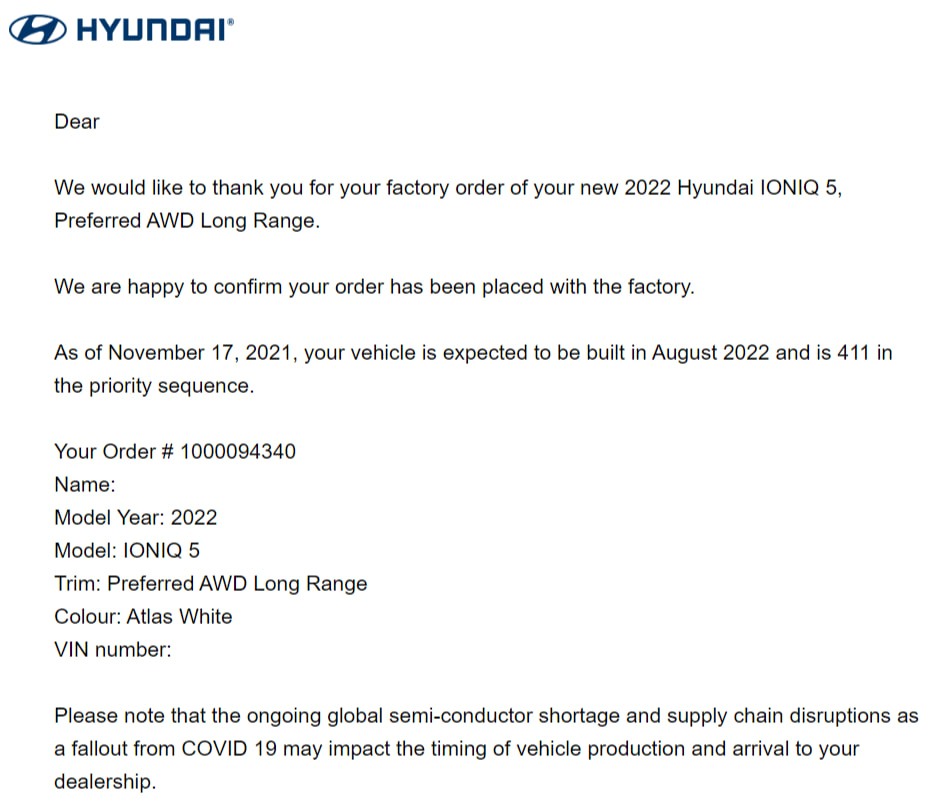
Well luckily, we weren’t in a rush for a new car! And by the time it got built, shipped from South Korea, and arrived at our dealer, we were probably looking at a September/October 2022 timeframe for it actually being delivered.
We weren’t able to test drive or even see it – the dealer didn’t have one. However, in early January, they did have a dedicated vehicle for test driving the Ioniq 5, so we did take it for a spin around town. We were very impressed by the vehicle.
A couple of weeks after our test drive, we got a call saying our car was in Vancouver and was on its way to the dealer, and would probably be arriving in a couple of weeks.
The fact that it was already coming was a complete shock – they didn’t know for sure, but the dealer thought that many people cancelled their pre-orders and we shot up the list (I do wonder how many of those people regret that decision with today’s gas prices).
About 3 weeks after that phone call, I got a call saying our car was being loaded on a truck in Saint John and would be in the next day. After a day of dealer prep, we drove away in our new electric car on February 17, 2022.
Wondering what a wait time might be like for this car? I was recently at the dealer and asked. They said they had a 60 person waiting list, and if you added yourself to it, it could be at least 2 years before you see one.
Our 4 month experience with an electric car
How have things gone? Better than we could ever have expected.
First, we’re saving way more on gas than I could have predicted. With the price of gas soaring, in our last month we saved almost $460. This spreadsheet I put together will show you what we’ve saved so far over our previous vehicle.
I sure don’t miss feeling a pinch in my wallet with every trip to a gas station (which seemed to happen more often than I expected). Sure, I still have my second vehicle for occasional trips into town, but so far I’ve bought about 60 litres of gas in 4 months. I love the ability to simply plug in my car in my garage and wake up to a fully charged, full-range car in the morning.
How long does it take to charge? We typically charge our car to 80% – it’s a way to prolong the life of the battery. Going from 20% to 80% typically takes our car about 5 hours with our level 2 charger.
With the amount it’s been driven so far, a gas vehicle would have needed an oil change so far. I don’t need to do that. It will require a 12,000 km check soon, but that will be much cheaper than a standard oil change.
It’s not perfect though. There’s the long range trips where it falls a bit short. It’s not the car per se, but the infrastructure. There aren’t many super-rapid charges that could charge it in 15 minutes. And the ones that do exist don’t work as advertised. There are plenty of other rapid chargers, but they would all take at least an hour for a charge. It’s quite the change from heading to the gas station, topping up, and leaving in under 5 minutes.
What is our range? With a 100% charge, we can go around 440 km. But realistically, you don’t want to take your battery under 10%, so it’s more like a 400 km range. A far cry from my previous vehicle that could drive for 650 km on one tank before the reserve light came on.
We have tried it out on a long range trip. We took it to Halifax for an overnight stay. Our car has more than enough range to get there (it’s around 300 km).
And while there are a few hotels that do have a charger we could use, we didn’t stay at one.
Instead, we were going to rely on Petro-Canada’s network of super-rapid chargers. There’s one before you get into Halifax in Stewiacke. We were going to stop there, get an 80% charge for our driving around Halifax, and stop again for a full charge on our way back home.
The charger is supposed to be able to provide 200 kW of power, which should have done the job in 15 to 20 mins. But that’s not what happened – it only worked at just under 25% of capacity. We got just enough charge to get around Halifax.
On our way out, we ended up waiting over an hour to get the charge we needed to get home, which was less than ideal.
Our lesson? For the time being, it’s not a “long road trip” kind of car. If we can make it to our destination on one charge, we’ll take it, but our hotel needs to have a charger we can use so we’re not relying on finding a charger somewhere.
We’re planning a trip to Quebec City this summer, and right now, our EV won’t be making the trip. While I have no doubts in being able to charge it, we’re not interested in charging it for an hour for every 3 hours of driving.
I have found that there are plenty of chargers out there for the public to use. However, most of them are of the level 2 variety. There are the occasional level 3 chargers with up to 50 kw of power, but those still take a while to charge.
And beware of Petro-Canada’s EV network. Despite their terrific advertising, they don’t work like they should (it’s almost as if a company that sells gas doesn’t want people using electric cars).
To find an EV charging station, there are plenty of useful apps. I use Plugshare. There are plenty of users who leave reviews as to how well a charger worked, and they can filter chargers that will work for your specific vehicle. You can download it for iOS here and Android here. And they also have a version you can view on any web browser here.
Win a Tesla Model 3
One thing is for certain – it’s not easy to buy an electric car right now, you’ll be waiting a while.
So why not try to win one? You can win a Tesla Model 3 thanks to our GeniusCash program.
Apply for and get approved for select credit cards through our offers page, and you’ll be entered into a draw to win a Tesla Model 3.
You better hurry though, our Tesla giveaway ends on June 30, 2022.
Here are all the details on our giveaway.
Now you’ve heard my story, would you get an electric car?
That’s my experience to date with an EV. It’s perfect for all our local driving and overnight trips within our car’s range.
When we’re done driving for the day, if the battery needs charging, I just plug it in and it’s ready to go in the morning.
It’s only downside is long road trips. And it has nothing to do with the car – the super-rapid charging infrastructure isn’t there yet. But we’re optimistic the latest technology will be available soon to ease our range anxiety.
In the market for a new car? Will you consider electric for your next one?
Let us know in the comments below.
FAQ
What is the federal electric vehicle rebate?
The federal electric rebate provides up to $5,000 in rebates on electric and plug-in hybrid vehicles. Not all vehicles are eligible for a rebate, though. Depending on the type of vehicle, the base model needs to have an MSRP under a certain amount.
What Hyundai electric car options are there?
Currently, Hyundai has 2 pure electric cars – the Hyundai Kona and Ioniq 5. Most Hyundai vehicles that have gas engines also have a hybrid or plug-in hybrid option.
Are there provincial electric car rebates?
Many provinces in Canada have an electric car rebate program. Some of them also offer rebates on a level 2 car charger. You can see more details on what each province offers here.
creditcardGenius is the only tool that compares 126+ features of 228 Canadian credit cards using math-based ratings and rankings that respond to your needs, instantly. Take our quiz and see which of Canada's 228 cards is for you.


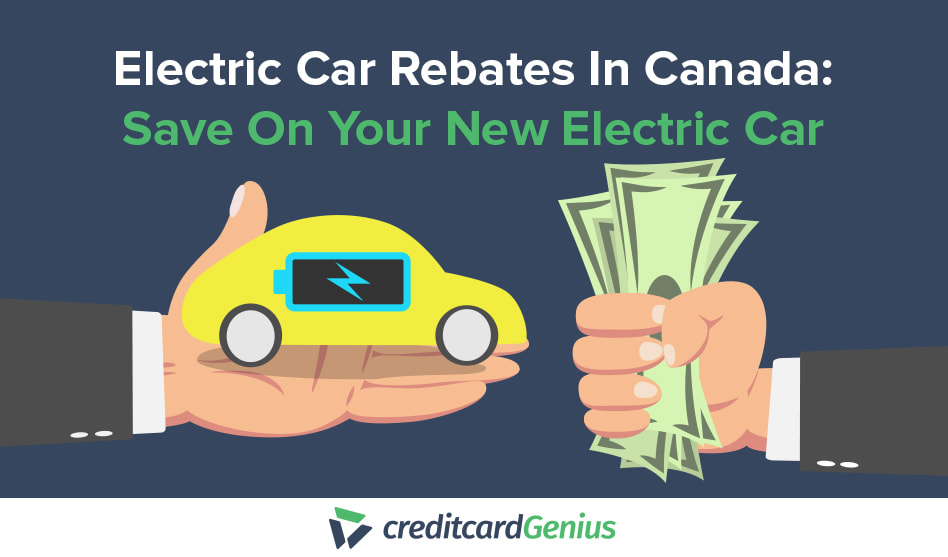

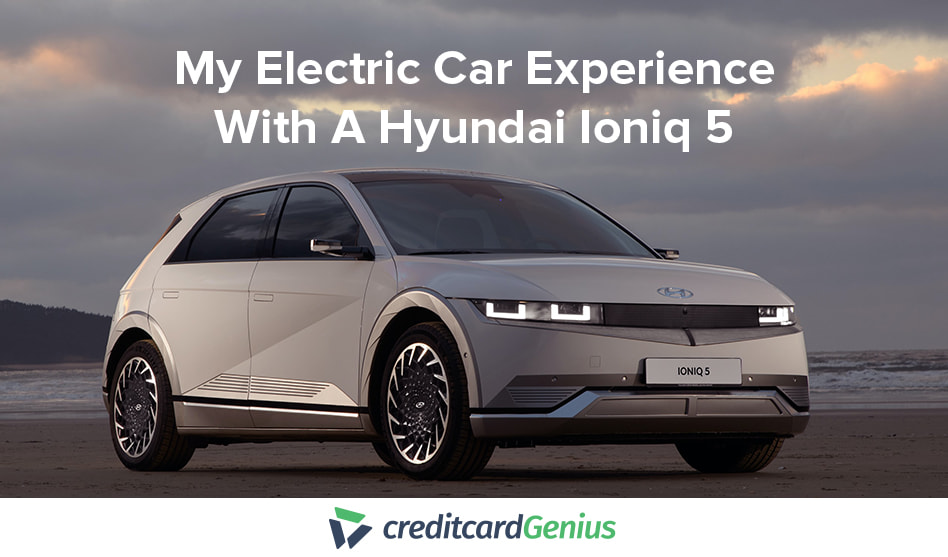
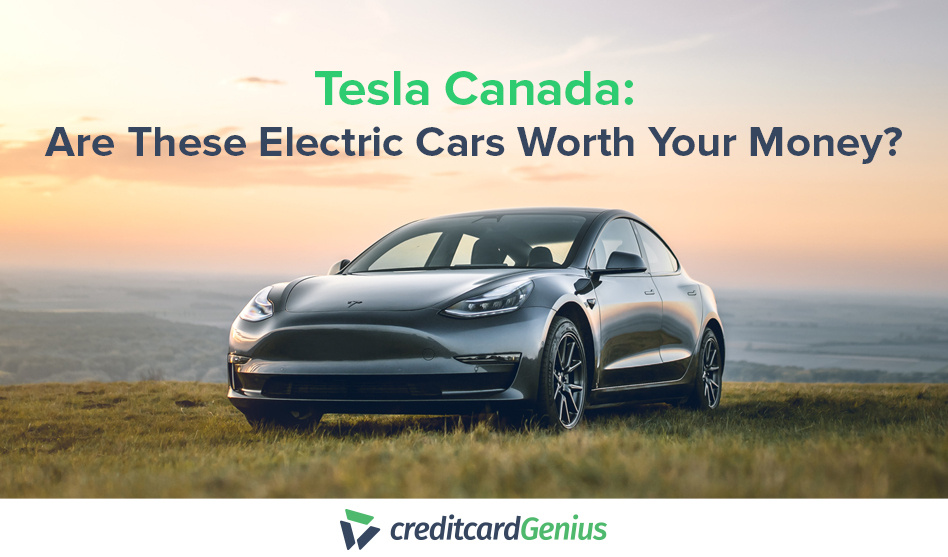


 GC:
GC: 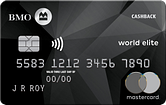































Comments
Leave a comment
Required fields are marked with *. Your email address will not be published.
Showing 8 comments